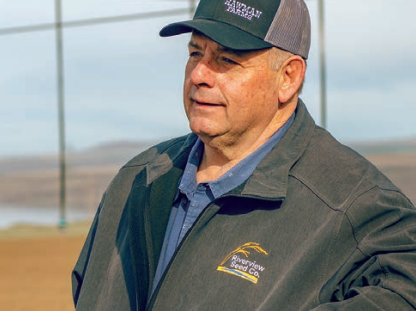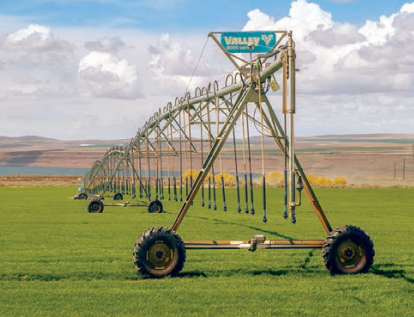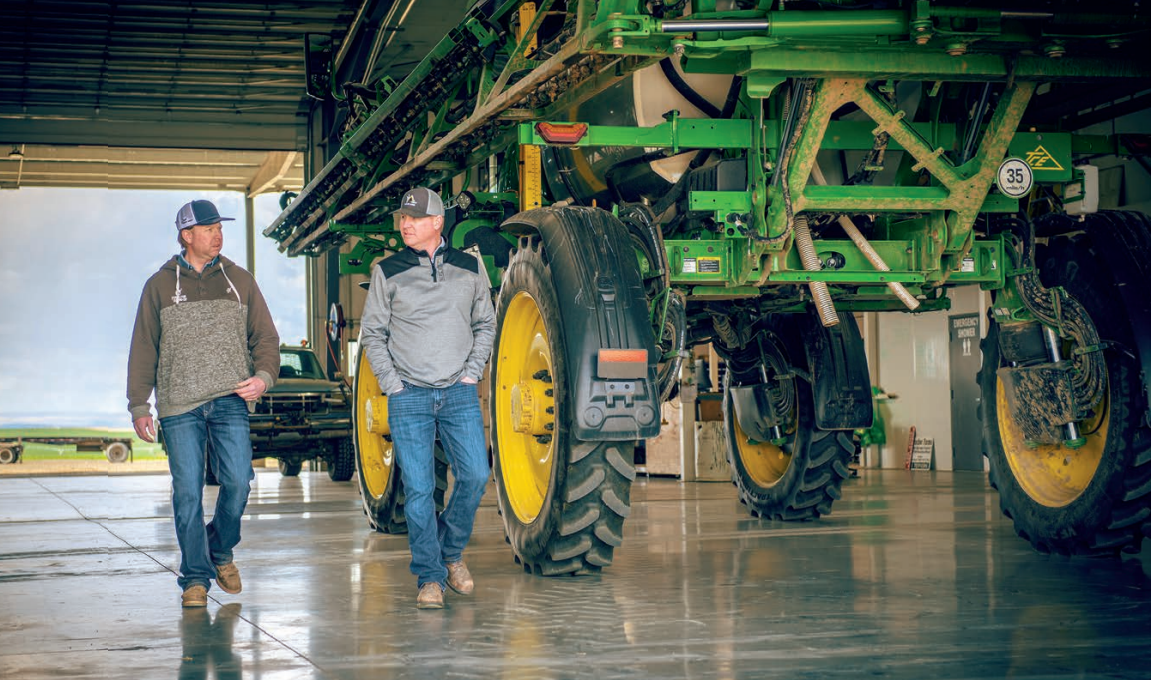Need Help
If you need help setting up services or accessing your accounts, please call our Customer Care Team at 866.552.9172 during business hours (7 a.m. — 5 p.m. PST, M-F) or email us at CustomerCare@AgWestFC.com.
Location
If you need help setting up services or accessing your accounts, please call our Customer Care Team at 866.552.9172 during business hours (7 a.m. — 5 p.m. PST, M-F) or email us at CustomerCare@AgWestFC.com.
Location
If you need help setting up services or accessing your accounts, please call our Customer Care Team at 866.552.9172 during business hours (7 a.m. — 5 p.m. PST, M-F) or email us at CustomerCare@AgWestFC.com.
Securely update and exchange balance sheet information with your AgWest team.
Put your idle cash to work with a suite of banking services that sweeps funds between accounts. Fees apply.
In the high desert country of eastern Oregon – known for stingy rainfall and loamy soils – members of the Cold Springs Canyon partnership gather around the table at the Riverview Seed Company.
These partners are from three neighboring farms, and farm families, who raise very different crops for diverse markets. On this dryland plateau above the Columbia River, they’ve come together to share their resources – land, water rights and financial strength – to build strong businesses for the next generation.
One of the first lessons parents teach their children is how to share and get along with others. If you’ve raised a child, you know, this doesn’t come instinctively to them. Or some adults either. Maybe that’s why more than 50% of business partnerships fail, especially when resources are tight, and family livelihoods are at stake. But those who can successfully navigate the challenges will tell you, they’re stronger and better together.

Mike Hawman
Mike Hawman and his sons, Alex and Kevin, are top-notch grass seed producers and processors. Neighbor, Greg Juul and his partner Troy Betz grow and process potatoes and custom feed dairy heifers. Their families have been farming with irrigation here since the late 1960s. The patriarch of the group, Cliff Bracher, working with his sons, Paul and Randy, have been traditional dryland farmers for five generations. That is until the three operations pooled their resources to form a landholding company for irrigated cropland and funded an impressive irrigation project on the Columbia River. Simply put, Mike and Greg had the water rights and the Brachers had the land.
Most people go to attorneys to form a business partnership. This wasn’t the case with Cold Springs Canyon (CSC). These neighbors are like family. They share a deep respect for each other and value one another’s strengths. So, they all sat down together and asked themselves tough questions to create this partnership. They wrestled with the answers and worked through different scenarios to find the best path forward for everyone. In the end, all the attorney needed to do was draft the paperwork for their well-planned vision.

Sprinkler system
“We talked a lot about what was worth more in the partnership, land or water,” says Greg Juul. “If you have one without the other, they’re both essentially worthless. We had those discussions, about how to put a fair market value on the assets. Eventually, we realized this partnership wouldn’t work unless we valued the assets equally. We agreed to make the best decisions for everyone as a whole and that mindset has filtered down to everything we do.”
Since 2012, CSC has completed two irrigation projects using Oregon’s conserved water rights program. AgWest Farm Credit recently helped to finance a $1.6 million fish screen system to protect aquatic life from the massive hydroelectric turbines and pumps. The CSC partners are also founding members of the East Improvement District (EID), a $50 million irrigation project recently completed on the Columbia River. The EID was created and funded by 13 private landowners and financed by the Farm Credit System (with support from the state) to give farmers access to river water and in turn, recharge aquifer supplies. Today the project spans 107,000 acres in the EID boundary and up to 24,000 acres as a supplemental or mitigated water right source.
The CSC partners have been neighbors and friends for three generations. Whether they’re farming CSC ground or their own properties, they operate as one. Greg and Mike have been wise mentors for Cliff’s sons Randy and Paul, teaching them how to farm with pivot irrigation to grow higher-value crops like alfalfa, corn and grass seed. Today, Greg trusts them to manage his entire grass crop, so he can focus on potatoes. Mike’s sons Alex and Kevin help to grow and process the seed.
“Individually we’re only as successful as our partners are,” says Paul Bracher. “That’s the way we approach everything. When you think about yourself first, you’re always going to be in competition with someone. In this operation, we put the partnership first and in turn, we all benefit.”
To be competitive in the market, the partners have common goals when it comes to buying equipment. They share everything to fully utilize their assets and spread costs. Admittedly, they see plenty of opportunities for conflict if timing collides, especially during harvest, which is why communication is essential.
Together, they create a detailed plan to plant and harvest across the three operations. Still, it’s hard to imagine the logistics involved to schedule and move massive pieces of equipment – to the right place at the right time – across thousands of acres. And as every farmer knows, Mother Nature is always known to throw an extra curve ball or two. That’s why these partners communicate with each other continually. If a piece of equipment isn’t ready as planned, they’ve learned to be flexible and creative together.

Randy and Paul
Bracher in their equipment
shop.
Holding each other accountable is also key. When someone uses a tractor, it’s returned clean and fueled. Each operator is required to complete a logbook to track hours used and invoices are processed accordingly. The CSC partners don’t believe in subsidizing each other. Instead, they reconcile invoices and expenses to ensure everything is fair for everyone. It’s just good business, they say.
Senior members of the CSC partnership are proud to see the next generation stepping forward to learn and lead. The natural age difference between generations, about every 10 years or so, has been a unique advantage for their succession plans. Different generations bring different experiences and perspectives. Plus, seven minds are better than one.
“I see the level of excitement and vision for the future when my son, or one of my employees, works with Cliff or Mike’s sons,” says Greg. “I know they have a high level of care and they’re going to train them like their own. It’s pretty cool to watch. I know my son respects me, but I think he would rather be taught by someone other than his dad.”
Soon, the partners will welcome another generation into their operations. They’ll be teaching them how to work together and find new, creative ways to share their resources – land, water, equipment, labor and minds. And, when things don’t go as planned, they’ll have plenty of wise mentors to reach out to for help.
“This partnership is really unique when you think about it, and I’m excited about the future,” says Kevin Hawman, the youngest member of the CSC group. “Because someday, 20 years from, now I'll be sitting here with the next generation having the same conversations. Who knows, maybe someone will even write an article about us. That’s what I’m looking forward to.”
Read more stories from our Young, Beginning and Small customers.